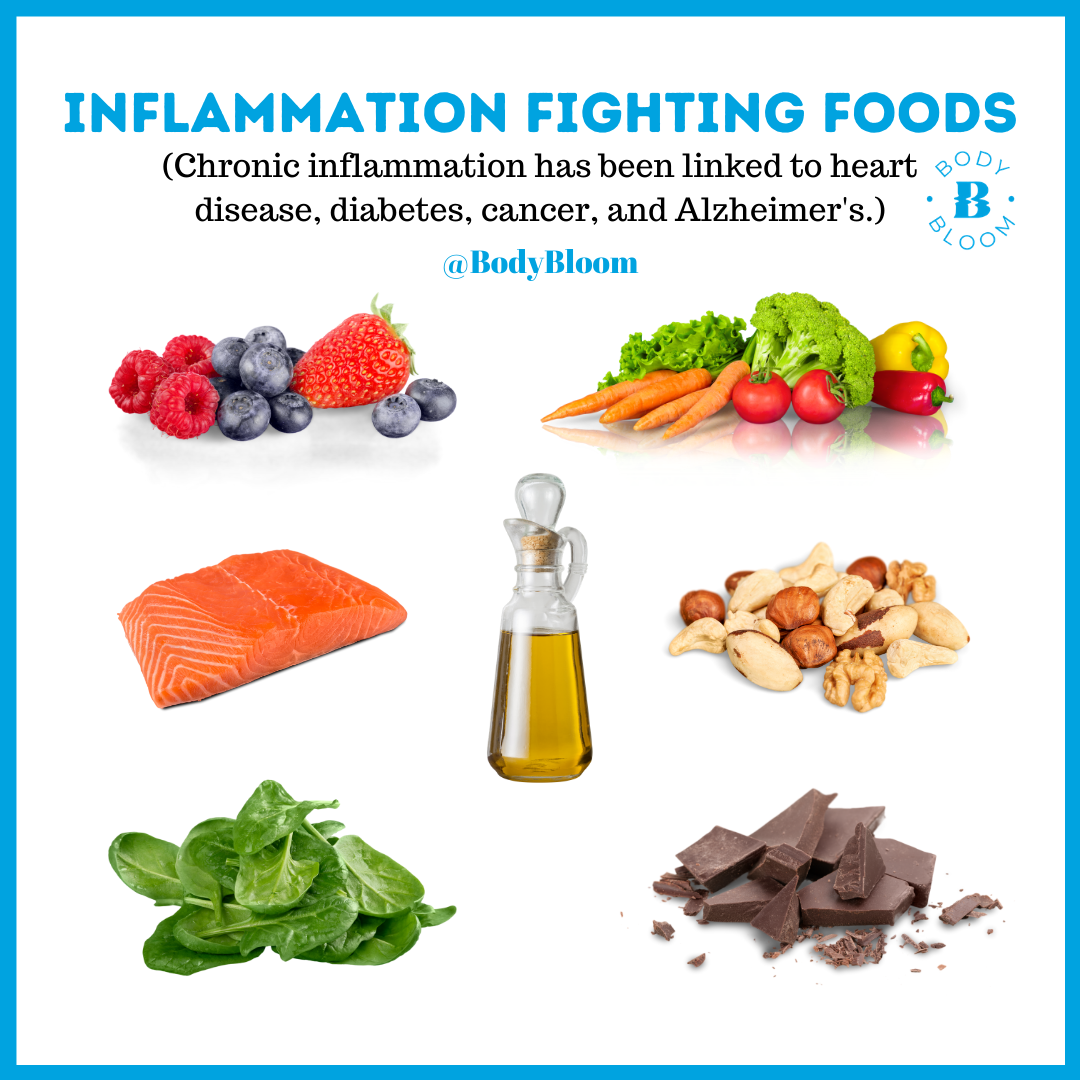Inflammation and the human body are in a committed relationship, and sometimes, it gets complicated. In a perfect world, inflammation shows up when our bodies recognize an intruder (usually an infection or injury) and leaves once we are healed. However, when inflammation gets clingy, it becomes chronic and can be linked to serious health issues such as heart disease, diabetes, cancer, and Alzheimer’s.1
Some common symptoms of chronic inflammation include:
- Body pain
- Depression and anxiety
- Weight gain or weight loss
- Chronic fatigue and insomnia
- Frequent infections
- Constipation, diarrhea, and acid reflux2
Thankfully, the science around inflammation shows that certain foods may help combat it to help bring our bodies back to a state of homeostasis. Here are 7 foods that are scientifically proven to refuse inflammation.
- Berries. Fruits such as strawberries, blueberries, raspberries, and blackberries contain anthocyanin, causing the colorful hues of red, purple, blue, and black. They also contain antioxidant effects that have been linked to reducing inflammation.3
- Vegetables. Carrots, broccoli, tomatoes, and bell peppers are all excellent choices to fight inflammation. The combination of Vitamin C and antioxidants that these veggies contain creates a powerful blend of inflammation-fighting nutrients.
- Fatty fish. Omega-3 fatty acids found in fish such as salmon, tuna, mackerel, sardines, and anchovies are widely considered excellent sources for reducing chronic inflammation.4
- Nuts. The frequent consumption of nuts has been found to reduce inflammation, and the risk of cardiovascular disease and type 2 diabetes.5 You can enjoy these benefits with various nuts such as almonds, peanuts, walnuts, hazelnuts, and pecans.
- Leafy greens. If you need another reason to fill up your salad bowl with leafy greens, here you go. Greens like spinach, kale, collard greens, Swiss chard, and leaf lettuce all tout potent anti-inflammatory properties.
- Olive oil. Olive oil, specifically extra-virgin olive oil, contains a compound called Oleocanthal that has been compared to ibuprofen with its ability to fight inflammation.6
- Dark chocolate. We couldn’t round this list out without mentioning everyone’s favorite superfood; dark chocolate. As if we needed another reason to love it, it turns out that it is actually packed with antioxidants that help reduce inflammation. To reap the benefits, you’ll want your chocolate to contain 70% cacao or more, so keep that in mind while shopping and enjoy the perks of chocolate!
Add these inflammation-fighting foods to boost your health and wellness. We hope you take these tips with you next time you’re shopping, especially if you’re experiencing symptoms of chronic inflammation. And as always, if you are concerned about your health, schedule a visit with your primary doctor. Here at Body Bloom, we aim to provide you with health tips and resources, but we are not licensed medical professionals, and we always recommend seeking proper medical care for symptoms.
References
- Minihane, Anne M et al. (2015). “Low-grade inflammation, diet composition and health: current research evidence and its translation.” The British journal of nutrition. Retrieved from https://www.ncbi.nlm.nih.gov/pmc/articles/PMC4579563/
- Pahwa R, Goyal A, Bansal P, et al. (2020). Chronic Inflammation. [Updated 2020 Aug 10]. In: StatPearls [Internet]. NCBI Retrieved from https://www.ncbi.nlm.nih.gov/books/NBK493173/
- Joseph, S. V., et al. (2014). Berries: anti-inflammatory effects in humans. Journal of agricultural and food chemistry, 62(18), 3886–3903. Retrieved from https://pubmed.ncbi.nlm.nih.gov/24512603/
- Tabbaa, M., et al. (2013). Docosahexaenoic acid, inflammation, and bacterial dysbiosis in relation to periodontal disease, inflammatory bowel disease, and the metabolic syndrome. Nutrients. Retrieved from https://www.ncbi.nlm.nih.gov/pmc/articles/PMC3775255/
- Yu, Zhi et al. (2016). Associations between nut consumption and inflammatory biomarkers. The American Journal of Clinical Nutrition. Retrieved from https://www.ncbi.nlm.nih.gov/pmc/articles/PMC4997300/
- Lucas, Lisa et al. (2011). Molecular mechanisms of inflammation. Anti-inflammatory benefits of virgin olive oil and the phenolic compound oleocanthal. Current pharmaceutical design. PubMed. Retrieved from https://pubmed.ncbi.nlm.nih.gov/21443487/



